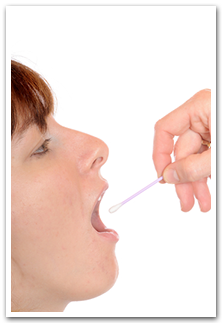Hey Everyone!
If Dr. David Wong and his research team have their way, dentistry may never look the same  again. The Journal of the American Dental Association has published an exclusive addition to Dr. Wong’s October study which revealed saliva can capture an individual’s biological makeup and status. And that’s just the beginning.
again. The Journal of the American Dental Association has published an exclusive addition to Dr. Wong’s October study which revealed saliva can capture an individual’s biological makeup and status. And that’s just the beginning.
In his recent article, the Associate Dean of Research at UCLA School of Dentistry, identified the current state of salivary diagnostic research, emphasized advances made by other scientists and forecasted the direction for future clinical applications and possible research. The detection, treatment and prediction of recurring medical conditions using saliva samples, which is both convenient and inexpensive, will translate into practical clinical applications administered by both doctors and dentists. His article exposes the impact the dental profession will have on primary health care with chairside screening of saliva. It’s likely that further research into salivary research or “salviomics” will change your future dental check-ups.
What is Salivaomics?
“Salivaomics” is the study of biological molecules in saliva. These studies indicate that saliva, which is made up of proteins, DNA, RNA and genes, will provide the basis of many tests at the molecular level.
Ongoing collaborative work with many scientists and UCLA researchers has created statistical tools and computational models that can decipher saliva’s traits to determine the early detection of disease. Early detection also means it can be used in treatment evaluation, recurrence interpretations and other medical assessments. Dr. Wong’s website Salivaomics Knowledge Base, or more commonly known as “The Wong Lab”, also identifies these tools to include genomic, metabolomic and proteomic profiling of saliva. In the future, both doctors and dentists will conveniently administer salivary diagnostic tests through a non-invasive, hand-held delivery system with state-of-the-art biosensor technology, thus saliva will be another health screening tool that is just as viable as blood and other bodily fluids. It may just be the solution to the early detection of diseases, cancers, diabetes and other conditions.
Changing the Face of Dentistry
As Dr. Wong suggests in his article, dentists will be placed in the front lines of primary health care. Research indicates the 20 percent of Americans visit their dentist more frequently than their primary care physician. If that’s the case, it gives dentists vast opportunities to change how primary care is administered to their patients. Not only does the study of salivaomics point to further research, but it will most likely have implications into how we perceive the dental professional, their educational requirements, and how primary health care is administered.
Call us at 248-356-8790 at Dr. Mark W. Langberg, DDS, MAGD, PC or use the contact form on lakeviewdentist.com if there is anything we can do to help!
Until next time,
Dr. Mark W. Langberg
